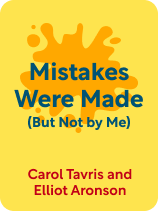

This article is an excerpt from the Shortform book guide to "Mistakes Were Made (But Not by Me)" by Carol Tavris and Elliot Aronson. Shortform has the world's best summaries and analyses of books you should be reading.
Like this article? Sign up for a free trial here.
Are humans rational? Are we less rational than we think we are?
In Mistakes Were Made (But Not by Me), Carol Tavris and Elliot Aronson say that we’re naturally inclined to believe that we’re rational actors moving through an ordered existence. However, our rationality can’t justify the bad things we do.
Find out why we use rationality to excuse bad decisions, and whether humans are as rational as we think we are.
Are You a Rational Person?
Are humans rational? While we can be rational, it doesn’t mean we always are. The authors note that to avoid dissonance, we refuse to acknowledge any information that suggests we’ve made a decision based on something other than rationality. Self-justification helps us convince ourselves that our irrational decisions and beliefs are actually well-founded.
(Shortform note: The idea that humans are uniquely rational creatures has endured in Western philosophy and psychology since the ancient Greek philosopher Aristotle posited that the ability to reason sets humans apart from other animals. However, some modern schools of philosophy hold the opposite true—they argue that humans are the only irrational animals. Other animals act without hesitation and in perfect alignment with their basic needs, while humans are constantly hindered by emotions such as doubt and fear, causing us to act against our own best interests. Therefore, the fundamental, dissonance-provoking belief that we always act rationally would be inherently false.)
Self-Justification in Big Decisions
According to the authors, we most often seek to protect our sense of rationality when we make important decisions, especially those that can’t be undone. Studies show that the more difficult a decision is to undo, the more we try to convince ourselves and others that we made the right choice. Likewise, the more money, time, and effort we spend on something, the more we try to rationalize the decision by highlighting the positives of our choice to ourselves and others. We need to justify the cost of our decision because if we can’t, we admit that we made an irrational choice, which triggers dissonance.
Example: Choosing an Expensive University
Say you decide to go to an out-of-state private university for your undergraduate degree instead of your in-state public university, even though the cost of the private university will put you in much more debt. To justify the financial burden and prove you made the most rational choice (not one based on another motivation, like a desire for prestige), you’ll begin the process of self-justification.
Maybe you argue that the private university has better programs or that a degree from there will lead to better job opportunities. Whatever your reasoning, to get rid of the dissonance that comes along with your looming student debt, you’ll likely tell anyone who asks how amazing it is at the private university and how you’re so glad you made the choice you did.
Rationality and Opportunity Costs
If, as we stated earlier, rationality is working toward the highest standard of “rightness,” then the self-justification of big decisions arguably comes from the fear that we made the wrong or irrational choice. Barry Schwartz expands on this idea in The Paradox of Choice, asserting that the stress we experience surrounding big decisions comes from opportunity costs, or the potential benefits of alternative choices that you lose once you make a decision.
Overthinking opportunity costs leaves us dissatisfied with our decision because we’re forced to make trade-offs between equally enticing benefits. When we give up the benefits of the alternative choices, we may feel like we’re moving further from what’s right, even if the benefits of the choice we did make are just as good. Thus, we fear that we’ve been irrational, and we feel compelled to justify our choice. According to Schwartz, it’s important to remember that opportunity costs are subjective and that there’s no objectively right (or rational) decision—just the right decision for you.

———End of Preview———
Like what you just read? Read the rest of the world's best book summary and analysis of Carol Tavris and Elliot Aronson's "Mistakes Were Made (But Not by Me)" at Shortform.
Here's what you'll find in our full Mistakes Were Made (But Not by Me) summary:
- Why we feel discomfort when we act in a way that doesn't align with our values
- How patterns of self-justification can cause our beliefs to diverge sharply from other people’s
- How we can break the cycle of self-justification and hold ourselves accountable






